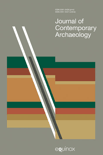
Journal of Contemporary Archaeology
Scope & Guideline
Connecting Historical Narratives with Contemporary Issues
Introduction
Aims and Scopes
- Contemporary Material Culture:
The journal focuses on analyzing objects and materials from contemporary contexts, exploring how they reflect social, political, and cultural dynamics. - Archaeology of Memory and Trauma:
It addresses themes of memory, trauma, and the legacy of conflict, particularly through the study of sites and artifacts related to war, repression, and societal upheaval. - Environmental Archaeology:
The journal investigates the relationship between humans and their environments, particularly in the context of waste management, sustainability, and the Anthropocene. - Cultural Heritage and Identity:
It emphasizes the role of archaeology in understanding cultural heritage and identity, especially in post-colonial and marginalized contexts. - Interdisciplinary Approaches:
The journal promotes interdisciplinary research that integrates archaeology with other fields such as anthropology, sociology, and environmental studies.
Trending and Emerging
- Waste and Environmental Issues:
There is an increasing focus on waste archaeology and the environmental impacts of human activities, reflecting global concerns about sustainability and ecological degradation. - Cold War and Post-Colonial Studies:
Research examining the legacies of the Cold War and post-colonial contexts is trending, as scholars seek to understand the complexities of these historical periods and their ongoing influence on contemporary societies. - Health and Medical Archaeology:
Emerging themes in health and medical archaeology are gaining traction, particularly in relation to the COVID-19 pandemic and its material culture implications. - Heritage and Identity in Urban Contexts:
The journal is seeing a rise in studies that explore the intersections of heritage, identity, and urban landscapes, reflecting contemporary issues of migration, gentrification, and social justice. - Interactivity and Digital Archaeology:
There is a growing interest in interactive and digital methodologies within archaeology, exploring how technology can enhance our understanding of cultural heritage and archaeological practices.
Declining or Waning
- Traditional Archaeological Methods:
There has been a noticeable decrease in papers focusing solely on traditional excavation and artifact analysis, as the journal increasingly prioritizes contemporary issues and interdisciplinary methods. - Historical Archaeology of Pre-20th Century Contexts:
Research centered on historical contexts prior to the 20th century is becoming less prominent, possibly due to a growing interest in modern and contemporary issues. - Narrowly Defined Regional Studies:
Studies that focus on specific regions without broader implications or connections to contemporary issues are less frequently published, indicating a shift towards more global and thematic inquiries.
Similar Journals

Ethnoarchaeology
Innovating Insights: Discovering Cultural Narratives Through EthnoarchaeologyEthnoarchaeology, published by ROUTLEDGE JOURNALS, TAYLOR & FRANCIS LTD, stands at the forefront of interdisciplinary research within the realms of anthropology and archaeology. With an ISSN of 1944-2904 and an E-ISSN of 1944-2890, this journal has demonstrated an impressive impact, categorized in the Q1 quartile for both anthropology and archaeology as of 2023. Acknowledged for its influence, it ranks 72/413 in Archeology (arts and humanities) with an impressive 82nd percentile, making it a vital resource for researchers and practitioners. Over its converged years from 2014 to 2024, the journal aims to bridge theoretical and practical aspects of ethnoarchaeology, fostering a deeper understanding of cultural practices through archaeological perspectives. Its commitment to advancing knowledge in this unique field is of utmost importance for academics, professionals, and students dedicated to exploring the interplay between contemporary societies and historical archaeological practices.
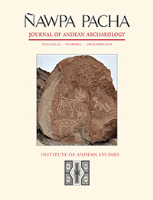
Nawpa Pacha
Exploring the Depths of Heritage and Innovation.Nawpa Pacha, a prestigious journal published by Taylor & Francis Ltd, stands as a significant platform for advancing research in Archaeology within the fields of Arts and Humanities. Since its inception in 2019, it has rapidly established itself with an impressive impact, evidenced by its categorization in the Q1 quartile for Archaeology and its significant rankings—placing it at Rank #88 in the Arts and Humanities category and Rank #86 in the Social Sciences. Published in the United Kingdom, the journal aims to foster interdisciplinary dialogue and promote scholarly work that contributes to the understanding of archaeological heritage and practices. Researchers, professionals, and students alike will find this journal indispensable for disseminating innovative methodologies, theoretical frameworks, and case studies that push the boundaries of archaeological inquiry. Whether seeking to explore historical narratives or contemporary archaeological challenges, Nawpa Pacha serves as a vital resource in the ever-evolving landscape of archaeological research.
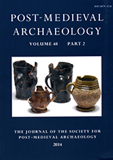
Post-Medieval Archaeology
Connecting Artifacts to Historical NarrativesPost-Medieval Archaeology is a distinguished academic journal published by ROUTLEDGE JOURNALS, TAYLOR & FRANCIS LTD, focusing on the rich tapestry of human history from the post-medieval period through the lens of archaeology. With a proud publication history spanning since 1967, this journal addresses the integration of archaeological findings with historical narratives, contributing significantly to the field of archaeology and history. The journal holds an impressive categorization within the Q2 and Q3 quartiles for Archaeology and History in 2023, showcasing its commitment to academic excellence and relevance within these disciplines. Researchers and professionals alike will find value in its critical examinations and innovative methodologies that illuminate the past, making it a pivotal resource for those engaged in archaeological research. As an essential platform for scholarly debate and dissemination, Post-Medieval Archaeology continues to advance the understanding of post-medieval contexts and material culture, fostering discussions that resonate through various areas of the arts, humanities, and social sciences.
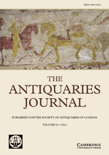
Antiquaries Journal
Exploring the Depths of Antiquity.The Antiquaries Journal, published by Cambridge University Press, is a prestigious publication dedicated to the multidisciplinary exploration of antiquarian studies, archaeology, history, and the visual arts. With an impact factor reflective of its influence within the academic community, it is essential reading for researchers, professionals, and students alike. This journal serves as a vital platform for disseminating cutting-edge research and scholarly discourse, particularly in its recent categorization within Q1 in Visual Arts and Performing Arts and Q2 in History. The journal spans a rich historical timeline from 1921 to the present, offering unique insights and fostering dialogue in the interrelated fields of archaeology and historical inquiry. While it is not an open-access journal, its commitment to rigorous peer review and academic excellence ensures that the content remains a critical resource for anyone engaged in the study of the past, particularly within the United Kingdom and beyond.
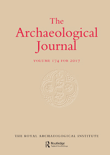
Archaeological Journal
Fostering Dialogue, Enriching Archaeological StudiesArchaeological Journal, published by Taylor & Francis Ltd, stands as a leading voice in the field of archaeology, with a remarkable distinction in the Q1 category for both arts and humanities as well as conservation, underscoring its critical role in advancing scholarly dialogue and research. With an ISSN of 0066-5983 and E-ISSN of 2373-2288, this journal provides a platform for innovative research from 1977, now offering insights up to 2024. The United Kingdom-based journal is highly regarded, being within the top 81st percentile in archaeology and conservation according to Scopus rankings. Essential for researchers, professionals, and students, the journal's content spans rigorous archaeological studies, theoretical advancements, and discussions on conservation practices, ultimately aimed at fostering a deeper understanding of humanity's past. Notably, with no open access option, it maintains a traditional publishing approach, thereby ensuring curated and high-quality contributions to the academic community.

Slovenska Archeologia
Exploring the depths of Slovakia's rich archaeological heritage.Slovenska Archeologia is a prominent journal published by the Slovak Academy of Sciences, Institute of Archaeology, dedicated to advancing the field of archaeology through rigorous scholarly research and insightful scholarship. With an ISSN of 1335-0102 and an E-ISSN of 2585-9145, this journal has been a vital platform for archaeologists and academics since its inception, converging its insightful publications from the years 2017 to 2023. Awarded a Q2 ranking in the field of archaeology across both arts and humanities categories, it holds a respectable position in the Scopus rankings, recognizing its contributions to the discipline. Based in Slovakia, the journal is an essential resource for professionals, researchers, and students interested in archaeological findings and methodologies. While it does not currently offer Open Access options, its commitment to promoting high-quality research makes it a valuable addition to the academic community.

Revista de Arqueologia Historica Argentina y Latinoamericana
Exploring the Rich Tapestry of Argentina and Latin America's HeritageRevista de Arqueologia Historica Argentina y Latinoamericana is a vital scholarly journal dedicated to the field of archaeology, with a particular focus on the historical dimensions of Argentina and Latin America. Published by the Assoc Professional Archaeologists Argentine Republic, this open-access journal has been enriching the archaeological discourse since 2007, making its valuable content freely accessible to researchers, professionals, and students around the globe. With an ISSN of 1851-3190 and an E-ISSN of 2344-9918, the journal aims to foster a deeper understanding of the archaeological heritage of the region by publishing innovative research articles, critical reviews, and methodological advancements in the study of historical archaeology. Positioned as a prominent platform for scholarship, it plays a crucial role in advancing archaeological knowledge while promoting interdisciplinary approaches within the field.

Mediterranean Archaeology & Archaeometry
Advancing Knowledge in Archaeology and ConservationMediterranean Archaeology & Archaeometry is a premier academic journal dedicated to advancing the fields of archaeology, anthropology, conservation, and history, published by UK Zhende Publishing Ltd. With its ISSN 1108-9628 and E-ISSN 2241-8121, this journal serves as a vital platform for scholars and practitioners to disseminate innovative research and findings related to the rich archaeological heritage of the Mediterranean region. It has gained remarkable recognition, achieving a Q2 ranking in anthropology and archaeology, and a Q1 classification in several categories including arts and humanities, conservation, and history as of 2023. Its impressive Scopus rankings underscore its impact, with a significant position in history (59/1760) and conservation (11/103) disciplines. Spanning years from 2008 to 2022, the journal invites open access contributions to foster collaboration and interdisciplinary dialogue among researchers, students, and professionals alike, making it an indispensable resource for those engaged in the exploration and preservation of historical narratives within the Mediterranean context.

Vestnik Permskogo Universiteta-Istoriya-Perm University Herald-History
Bridging the Past and Present through Academic ExcellenceVestnik Permskogo Universiteta-Istoriya (Perm University Herald-History), published by Perm State National Research University, serves as a pivotal academic platform for scholars in the fields of History, Archaeology, and Cultural Studies. With an ISSN of 2219-3111 and an impressive trajectory of convergence from 2019 to 2024, this journal has secured a commendable Q1 ranking in History and is recognized in the Q2 quartile across multiple relevant categories, demonstrating its significance in the scholarly landscape. Despite the absence of an open access model, the journal remains highly impactful and continues to contribute richly to the discourse surrounding historical and cultural research within the Russian Federation and beyond. The journal publishes original research, reviews, and theoretical papers, making it essential reading for those engaged in historical studies and related fields.
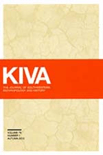
Kiva-Journal of Southwestern Anthropology and History
Unveiling the Past: Insights from the SouthwestKiva - Journal of Southwestern Anthropology and History is a distinguished academic journal published by Routledge Journals, Taylor & Francis Ltd, that serves as a vital resource for scholars in the fields of anthropology, archaeology, and history. With an ISSN of 0023-1940 and an E-ISSN of 2051-6177, this journal has established itself as a significant avenue for scholarly communication since its inception in 1964. It consistently ranks in the top quartiles, including Q1 in Archaeology and Q2 in Anthropology, reflecting its high impact and rigorous peer-review process. Covering a wide array of topics pertinent to the Southwestern United States, Kiva invites original research articles, reviews, and methodological papers that advance understanding of the region's rich cultural heritage and historical narratives. While currently not open access, its commitment to disseminating quality research makes it an essential reading for researchers, professionals, and students aiming to explore the multifaceted dimensions of southwestern studies.